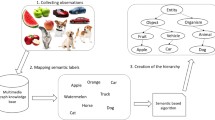Abstract
The recognition of objects and, hence, their descriptions must be grounded in the environment in terms of sensor data. We argue why the concepts used to classify perceived objects and used to perform actions on these objects should integrate action-oriented perceptional features and perception-oriented action features. We present a grounded symbolic representation for these concepts. Moreover, the concepts should be learned. We show a logic-oriented approach to learning grounded concepts.
First published in: Rembold et al. (eds.), (1995), Intelligent autonomous systems, IAS-4 (pp. 271–278). Amsterdam: IOS Press.
Access this chapter
Tax calculation will be finalised at checkout
Purchases are for personal use only
Preview
Unable to display preview. Download preview PDF.
Similar content being viewed by others
References
Abelson, R.P. (1963). Computer simulation of personality. New York: John Wiley.
Bennett, S.W. (1989). Learning uncertainty tolerant plans through approximation in complex domains. Technical Report UILU-ENG-89–2204, University of Illinois at Urbana-Champaign.
Brooks, R.A. (1986). A robust layered control system for a mobile robot. IEEE Journal of Robotics and Automation 2(1), 14–23.
Brooks, R.A. (1991). The role of learning in autonomous robots. In L.G. Valiant & M.K. Warmuth (eds.), COLT’91 Proceedings of the Fourth Annual Workshop (pp. 5–10). Santa Cruz, CA: Morgan Kaufman.
Cottrell, G.W., B. Bartell, & C. Haupt (1990). Grounding meaning in perception. In H. Marburger (ed.), Proceedings of the GWAI-90, 14th German Workshop on AI (pp. 307–321). Berlin: Springer.
De Jong, G.D., & R. Mooney (1986). Explanation-based-learning: An alternative view. Machine Learning 2(1), 145–176.
De Jong, G.D., & S. Bennett (1993). Permissive planning — A machine learning approach to linking internal and external worlds. Proceedings of the Eleventh National Conference on Artificial Intelligence (pp. 508–513). Washington, DC.
Dillmann, R., J. Kreuziger, & F. Wallner (1993). PRIAMOS — An experimental platform for reflexive navigation. In F.C.A. Groen, S. Hirose, & C.E. Thorpe (eds.), IAS-3: Intelligent Autonomous Systems (pp. 174–183). Amsterdam: IOS Press.
Gil, Y. (1994). Learning by experimentation — Incremental refinement of incomplete planning. In W. Cohen & H. Hirsh (eds.), Proceedings of the 11th International Machine Learning Conference (pp. 87–95). Rutgers, NJ: Morgan Kaufman.
Giordana, A., & L. Saitta (1990). Abstraction — A general framework for learning. In T. Ellmann, R. Keller, & J. Mostow (eds.), Proceedings AAAI — Workshop on Automatic Generation of Approximations and Abstractions (pp. 245–256). Boston, MA.
Harnad, S. (1990). The symbol grounding problem. Physica D, 42, 335–346.
Kedar-Cabelli, S. (1988). Toward a computational model of purpose-directed analogy. In A. Prieditis (ed.), Analogica (pp. 89–108). San Mateo, CA: Morgan Kaufman.
Kietz, J.-U., & S. Wrobel (1992). Controlling the complexity of learning in logic through syntactic and task-oriented models. In S. Muggleton (ed.), Inductive logic programming. The A.P.I.C. Series (pp. 335–360). New York: Academic Press.
Klingspor, V. (1994). GRDT: Enhancing model-based learning for its application in robot navigation. In S. Wrobel (ed.), Proceedings of the Fourth International Workshop on Inductive Logic Programming, GMD-Studien Nr. 237 (pp. 107–122). St. Augustin, Germany.
McCarthy, J., & P.J. Hayes (1969). Some philosophical problems from the standpoint of artificial intelligence. Machine Intelligence 5, 463–502.
Millán, J., & C. Torras (1992). A reinforcement connectionist approach to robot path finding in non-maze-like environments. Machine Learning 8, 363–395.
Mitchell, T.M. (1982). Generalization as search. Artificial Intelligence 18(2), 203–226.
Muggleton, S. (1992). Inductive logic programming. London: Academic Press.
Nelson, K. (1983). The derivation of concepts and categories from event representations. In E.K. Scholnick (ed.), New trends in conceptual representation: Challenges to Piaget’s theory? (pp. 129–149). Hillsdale, NJ: Lawrence Erlbaum Assoc.
Segre, A. (1988). Machine learning of robot assembly plans. Boston, MA: Kluwer.
Steels, L. (1993) Building agents out of autonomous behavior systems. In L. Steels & R.A. Brooks (eds.), The ‘artificial life’ route to ‘artificial intelligence’ — Building situated embodied agents (pp. 83–119). Hillsdale, NJ: Lawrence Erlbaum Ass.
Wallner, F., M. Kaiser, H. Friedrich, & R. Dillmann (1994). Integration of topological and geometrical planning in a learning mobile robot. Proceedings of the IEEE/RSJ International Conference on Intelligent Robots and Systems (IROS-94). Piscataway, NJ: IEEE.
Wrobel, S. (1991). Towards a model of grounded concept formation. Proceedings of the 12th InternationalJoint Conference on AI (pp. 712–719). Los Altos, CA: Morgan Kaufman.
Zercher, K. (1992). Wissensintensives Lernen für zeitkritische technische Diagnoseaufgaben. Sankt Augustin, Germany: Infix-Verlag.
Author information
Authors and Affiliations
Editor information
Editors and Affiliations
Rights and permissions
Copyright information
© 2000 Springer Science+Business Media Dordrecht
About this chapter
Cite this chapter
Klingspor, V., Morik, K. (2000). Towards Concept Formation Grounded on Perception and Action of a Mobile Robot. In: Cruse, H., Dean, J., Ritter, H. (eds) Prerational Intelligence: Adaptive Behavior and Intelligent Systems Without Symbols and Logic, Volume 1, Volume 2 Prerational Intelligence: Interdisciplinary Perspectives on the Behavior of Natural and Artificial Systems, Volume 3. Studies in Cognitive Systems, vol 26. Springer, Dordrecht. https://doi.org/10.1007/978-94-010-0870-9_59
Download citation
DOI: https://doi.org/10.1007/978-94-010-0870-9_59
Publisher Name: Springer, Dordrecht
Print ISBN: 978-94-010-3792-1
Online ISBN: 978-94-010-0870-9
eBook Packages: Springer Book Archive




